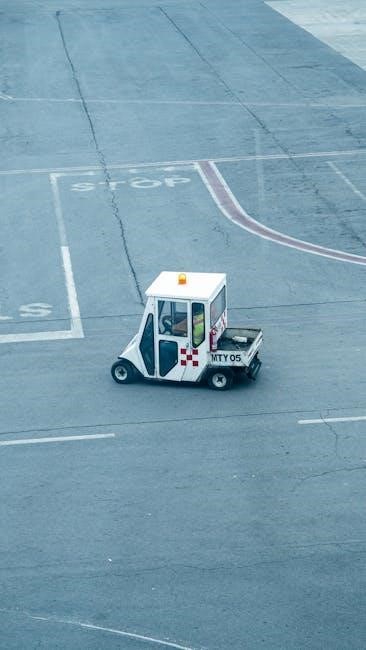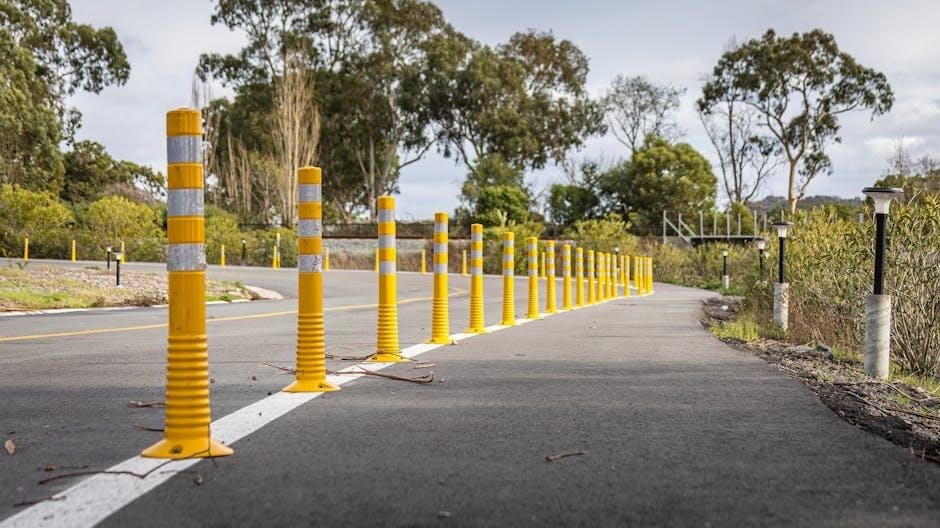A Private Road Maintenance Agreement PDF is a legally binding document outlining responsibilities for maintaining private roadways. It ensures safety, cost-sharing, and proper upkeep among property owners, customizable to specific needs and legally enforceable.

Definition and Scope of the Agreement
A Private Road Maintenance Agreement PDF defines the legal framework for maintaining private roadways, ensuring clarity on responsibilities and obligations among property owners. It outlines the scope of work, including repairs, improvements, and regular upkeep, to keep the road safe and functional. The agreement typically covers the proportionate sharing of costs, the roles of each party, and the duration of the agreement. It may also include provisions for dispute resolution and enforcement mechanisms. This document is customizable to address specific conditions of the private road and the needs of the parties involved. By establishing a clear and mutually agreed-upon plan, the agreement helps prevent conflicts and ensures the road remains in good condition for all users. It is a vital tool for property owners who share access via a private road, providing a structured approach to maintenance and cost management.
Importance of a Private Road Maintenance Agreement
A Private Road Maintenance Agreement is crucial for ensuring the safety and accessibility of private roadways. It establishes clear responsibilities among property owners, preventing disputes and fostering cooperation. By outlining cost-sharing arrangements, the agreement promotes fairness and transparency, ensuring no single party bears an undue financial burden. It also guarantees that the road is maintained in good condition, which is essential for emergency vehicle access and the overall value of the properties it serves. Additionally, the agreement provides a legal framework for addressing maintenance issues, ensuring that all parties are held accountable. This document is particularly vital for communities reliant on private roads, as it helps maintain property values and ensures the road remains functional for years to come. Without such an agreement, disagreements over repairs and costs can escalate, leading to neglect of the road and potential legal conflicts.
Key Elements of the Agreement
A Private Road Maintenance Agreement PDF typically includes several essential components to ensure clarity and enforceability. First, it outlines the scope of maintenance responsibilities, detailing which aspects of the road, such as paving, snow removal, and drainage, are covered. Second, it specifies the cost-sharing model, such as equal distribution or proportionate payment based on usage or property value. The agreement also defines the payment terms, including deadlines and methods for contributions. Additionally, it establishes a dispute resolution process to address any conflicts that may arise. The document often includes a term and termination clause, specifying how long the agreement remains in effect and under what conditions it can be amended or dissolved. Finally, it may require signatures from all parties involved, ensuring mutual agreement and legal binding. These elements work together to create a comprehensive and enforceable agreement for private road maintenance.

Legal Considerations and Requirements
A Private Road Maintenance Agreement must comply with local laws and regulations, ensuring all terms are legally enforceable. Legal review is crucial to validate the document, prevent disputes, and guarantee adherence to relevant statutes and zoning requirements.
Why Legal Review is Essential for the Agreement
A legal review of the Private Road Maintenance Agreement ensures compliance with local laws and regulations, making the document legally binding and enforceable. An attorney can identify potential issues, such as ambiguous terms or missing clauses, and ensure the agreement aligns with zoning laws and property rights. This step prevents future disputes by clarifying responsibilities and cost-sharing among property owners. Legal oversight also verifies that the agreement is fair and protects the interests of all parties involved. Without proper legal review, the document may be deemed invalid or unenforceable, leading to potential conflicts or financial losses. Regular legal checks are crucial to update the agreement as laws evolve, maintaining its relevance and effectiveness. By involving legal experts, property owners can avoid pitfalls and ensure their private road maintenance plan is robust and legally sound.
Essential Clauses to Include in the Agreement

A well-drafted Private Road Maintenance Agreement should include several essential clauses to ensure clarity and enforceability. First, a definitions section should outline key terms, such as “private road” and “maintenance,” to avoid ambiguity. Next, a scope of responsibility clause should detail which parties are responsible for specific aspects of road upkeep, such as repairs, snow removal, and vegetation control. A cost-sharing model is crucial, specifying how expenses will be divided among property owners, whether equally or based on usage. Additionally, a dispute resolution clause should outline procedures for resolving disagreements, such as mediation or arbitration. The agreement should also include a term and termination clause, defining the duration of the agreement and conditions under which it can be amended or dissolved. Finally, a compliance clause ensures adherence to local laws and regulations, and a signatory section provides a place for all parties to acknowledge their agreement. These clauses collectively ensure the agreement is comprehensive, fair, and legally binding.

Compliance with Local Laws and Regulations

Ensuring compliance with local laws and regulations is a critical aspect of a Private Road Maintenance Agreement. The agreement must align with municipal, county, or state ordinances governing private roadways. This includes obtaining necessary permits for repairs and improvements, adhering to safety standards, and meeting environmental regulations. For instance, maintenance activities such as drainage modifications or vegetation removal may require prior approval from local authorities. Additionally, the agreement should reference specific zoning laws or homeowners’ association rules that apply to the private road. Compliance ensures that all parties avoid legal penalties and fines. It also guarantees that the road remains safe and accessible, particularly for emergency vehicles. Legal review of the agreement by a qualified attorney is essential to verify that all local requirements are met. By incorporating compliance clauses, the agreement not only protects the interests of property owners but also upholds public safety and regulatory standards. This ensures the private road is maintained responsibly and lawfully for years to come.

Financial Aspects of Private Road Maintenance
Understanding the financial responsibilities for private road maintenance is crucial. This includes cost-sharing models, budgeting for repairs, and establishing payment obligations to ensure equitable contributions among property owners and maintain the road’s condition effectively.
Cost-Sharing Models Among Property Owners
Cost-sharing models are essential for fairly distributing the financial burden of private road maintenance among property owners. Common approaches include equal sharing, where all owners contribute the same amount, or proportional sharing based on usage or property value. Some agreements allocate costs according to the number of parcels or the frequency of access. Usage-based models may involve tracking vehicle numbers or weighing the impact of commercial versus residential use. Property value-based models tie contributions to the assessed value of each property. Legal documents often outline these arrangements in detail to avoid disputes. It’s crucial to tailor the model to the specific needs and circumstances of the properties involved, ensuring transparency and equity. Regular reviews and adjustments may be necessary to reflect changes in ownership, road usage, or maintenance requirements. Proper documentation and agreement on cost-sharing models help maintain harmony among property owners and ensure the road remains well-maintained.
Budgeting and Tracking Maintenance Expenses
Budgeting and tracking maintenance expenses are critical components of a private road maintenance agreement. Property owners should collaboratively establish an annual budget based on anticipated maintenance needs, such as paving, snow removal, and repairs. Expenses can be estimated by reviewing historical costs or consulting professionals. A dedicated fund is often created to collect contributions from all parties, ensuring timely payments for scheduled and unexpected work. Tracking expenses involves maintaining detailed records of all maintenance activities, including invoices, receipts, and work completion reports. Transparency is key, as owners should have access to financial records to verify expenditures. Regular audits or reviews can help ensure that funds are used appropriately and that the budget remains aligned with actual costs. Proper budgeting and tracking not only prevent financial disputes but also ensure the road remains safe and well-maintained. This systematic approach fosters cooperation and accountability among all parties involved in the agreement.

Payment Obligations and Deadlines
Payment obligations and deadlines are essential components of a private road maintenance agreement, ensuring that all parties contribute fairly and timely to upkeep costs. Property owners are typically required to pay their share of maintenance expenses by a specified date, which is outlined in the agreement. Payments may be made annually, quarterly, or as needed for specific projects, depending on the terms negotiated. Failure to meet payment deadlines can result in penalties, such as late fees or legal action, as stipulated in the agreement. It is crucial for all parties to adhere to these obligations to avoid delays in maintenance and ensure the road remains safe and accessible. Clear communication and reminders can help prevent missed payments, fostering cooperation among property owners. By establishing firm deadlines and consequences, the agreement ensures accountability and the consistent upkeep of the private road.


